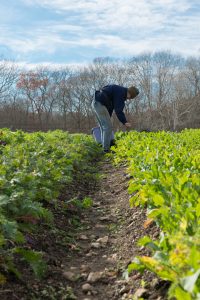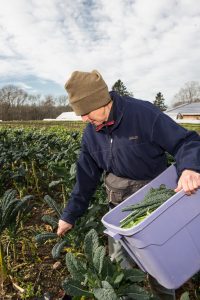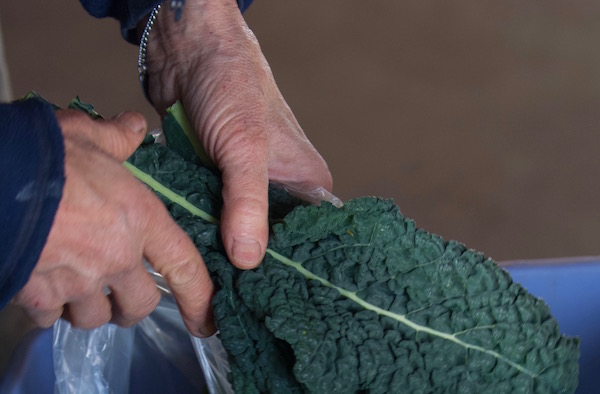As part of our healthy January series of blog posts, we’re sharing a favorite article from our 2016 print edition, featuring Dartmouth’s Eva Sommaripa who has been a pioneer in foraging wild greens and cultivating microgreens and herbs. Enjoy!
Spiritual Botany
Eva Sommaripa is so revered in the farming and culinary worlds that she doesn’t even need a last name. Everyone knows her simply as Eva. Even her farm’s equipment is labeled without a last name. “Return to Eva” proclaims an empty five gallon bucket.
Eva’s patch of land in Dartmouth near Allen’s Pond is famous, disproportionately famous given its small size. Her delicious baby greens and herbs accompany dinner at many of the finest restaurants in Boston and Providence. Chefs gush over them.

Eva’s Garden started as the family garden at their weekend getaway from Cambridge. She says, “I’d bring my herbs to sell to restaurants after the weekend when we stayed here. Then, my weekends got longer and longer.” And her garden grew. Cultivated fields took over the meadow that held the family’s volleyball net. She now has two acres of cultivated land and seven acres of uncultivated land from which she forages wild edibles.
Everything is organic.
On a sunny day in summer, her garden is the very definition of fertile. Flowers and herbs sprawl in the gardens near the cottages. Flavors and smells float intoxicatingly through the air. In greenhouses, exotic greens and herbs are lined up: mizuna, chervil, sorrel. Out in the fields, neat rows of baby mustard greens and pea tendrils are absorbing the sun’s rays in preparation for delivery to restaurants.
You can practically feel the photosynthesis happening all around you.
In person, Eva hums with energy, just like her garden. Gracious and inviting, she is happy to share with visitors and encourages you to sample her wares straight from the garden. She gives me a stalk of calaminth, and I take a tiny leaf.
My tongue explodes. I try her wispy pea tendrils that pack an intense pea flavor in a delicate package. Walking around her farm is like being a kid in a candy store. You gain a healthy respect for herbs and greens you never considered.
She introduces me to African blue basil, a relatively new and accidental herb, which was created on an Ohio farm when purple basil and calaminth crossed. It doesn’t grow from seed so it’s spread from gardener to gardener, each plant a clone from the initial mutation. When Eva describes it, the arrival and propagation of African blue basil seems almost spiritual.

Didi Emmons, chef and author of the book Wild Flavors, which celebrates Eva and her work, says that Eva is a “political farmer who doesn’t believe in waste.” When Eva learned about wild edibles and foraging from others, she took to it immediately and brought it to her chef-clients. She extolled the virtues of things that had formerly been considered weeds—purslane, juniper berries, chickweed, autumn olives and stinging nettles—so that they have become part of creative chefs’ repertoires.
In 2014, she received the Wellesley College Alumnae Achievement Award for her pioneering work in the food world and as an early leader of sustainable lifestyles. In accepting the award, she referred to her “quirky improvisational career that eludes familiar labels. It has been mostly about food, farming and nature…Getting high on nature has been my lifelong habit, verging on addiction.” She delighted the audience with four poems representing the seasons, including a Chaucer poem that she recited in its original Middle English (complete with hand gestures to assist in its comprehension).
Eva Sommaripa may not have had a business plan but it’s clear she’s created something strong and lasting from the dirt, prized and valued far beyond her plot of land. While we are out in her garden, an interesting sound comes across the fields. Her friend has come to collect her for dinner. Eva answers the call with a matching response, a loud and high “Yoo Hoo Hoo Hoo.” In this magical space, it seems appropriate that the friends sound like birds calling to one another.
If you enjoyed this profile, have our 2017 edition delivered right to your door at 30% off the newsstand rate. See more about that here.

